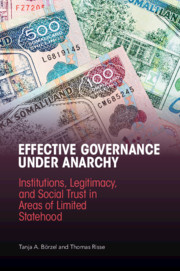 Effective Governance Under Anarchy
Effective Governance Under Anarchy Book contents
- Effective Governance Under Anarchy
- Effective Governance Under Anarchy
- Copyright page
- Contents
- Figures
- Tables
- Preface
- Abbreviations
- 1 Introduction
- Part I Setting the Stage: Concepts and Theories
- 2 Areas of Limited Statehood and Governance
- 3 Theorizing Governance in Areas of Limited Statehood
- Part II Governance in Areas of Limited Statehood: Empirical Evidence
- References
- Index
3 - Theorizing Governance in Areas of Limited Statehood
from Part I - Setting the Stage: Concepts and Theories
Published online by Cambridge University Press: 09 April 2021
- Effective Governance Under Anarchy
- Effective Governance Under Anarchy
- Copyright page
- Contents
- Figures
- Tables
- Preface
- Abbreviations
- 1 Introduction
- Part I Setting the Stage: Concepts and Theories
- 2 Areas of Limited Statehood and Governance
- 3 Theorizing Governance in Areas of Limited Statehood
- Part II Governance in Areas of Limited Statehood: Empirical Evidence
- References
- Index
Summary
Chapter 3 elaborates our theory of governance in areas of limited statehood. While existing approaches address certain pieces of our “governance puzzle,” none of them offers a satisfying answer. We develop a theoretical explanation for when and how actors are motivated to engage in governance. As to the role of (state) institutions, we argue that the shadow of hierarchy and the shadow of anarchy go a long way to incentivize actors to become governors. The same holds true for the quest for (international as well as domestic) legitimacy and social acceptance. Personalized trust relations within and among local communities not only helps overcoming collective action problems, but also leads to the demand for governance contributions. Next, we introduce our theory of effective and legitimate governance in areas of limited statehood. First, institutional conditions fostering effective governance consist of institutional design, inclusiveness and fairness, and residual statehood. Second, empirical legitimacy and social acceptance of the governors and the governance institutions matter for effectiveness. Last not least, personalized, group-based, and generalized trust constitutes a further enabling condition for effective governance.
Keywords
- Type
- Chapter
- Information
- Effective Governance Under AnarchyInstitutions, Legitimacy, and Social Trust in Areas of Limited Statehood, pp. 58 - 100Publisher: Cambridge University PressPrint publication year: 2021


